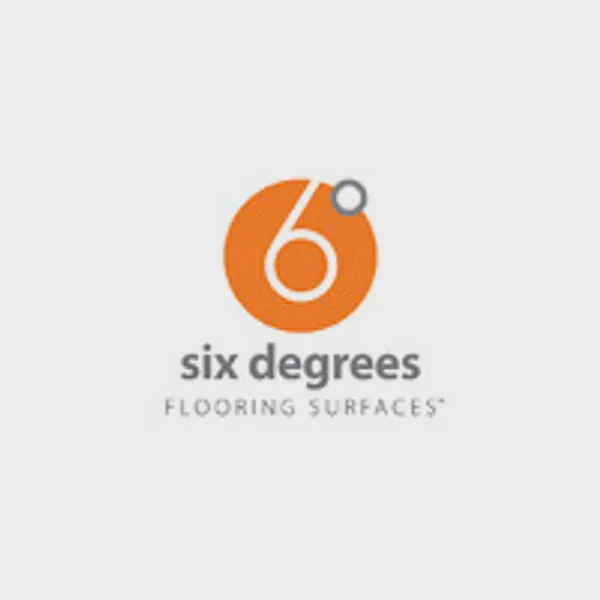Six Degrees Flooring Surfaces at a glance
Six Degrees is a focused player in commercial LVT and vinyl stair treads. If your team sells into education, healthcare, or workplace interiors, their palette and formats check familiar boxes. The question specifers ask next is simple. Where are the EPDs, and do they cover the SKUs we need today.


Who they are
Six Degrees Flooring Surfaces is a U.S. brand known for design‑forward luxury vinyl tile and coordinated treads, with manufacturing ties to the broader Roppe family. Their public profile lives here and on LinkedIn.
- Website: sixdegreesflooring.com/sustainability
- LinkedIn: https://www.linkedin.com/company/sixdegreesflooringsurfaces
What they make
The portfolio centers on glue down LVT across multiple collections such as Radius, Radius 2.0, DeGradus, Compass, Compass Colors, and the thicker Compass Plus 5 mm. They also list Impression vinyl stair treads for turnkey transitions. That mix positions them for resilient-heavy specs in schools, healthcare, retail, and offices.
How broad is the range
Across the named collections and colorways, the line spans several product families with total SKUs likely in the hundreds. Think of it as a well stocked toolbox for typical commercial LVT layouts and a smaller accessory set for stairs.
EPD status in one snapshot
Six Degrees participated in the 2024 Resilient Floor Covering Institute industry wide EPD for glue down LVT. That declaration is third party verified by SCS Global Services and valid from May 9, 2024 to May 8, 2029 (RFCI, 2024). Their own sustainability page confirms an available EPD for glue down LVT and points to that same window (Six Degrees Sustainability, 2024). EC3’s public database shows the Six Degrees manufacturer record with three older product specific LVT EPDs that expired on June 3, 2024, and no current brand labeled EPDs as of November 20, 2025, which is consistent with a shift to the RFCI industry wide document.
What’s covered today
- Glue down LVT collections are covered through the RFCI industry wide EPD, which typically satisfies common LEED material credit pathways when a project team allows industry average declarations (RFCI, 2024).
Likely gaps to watch
- Locking or loose lay LVT once had Six Degrees specific EPDs, now lapsed in mid 2024 per EC3. If those formats remain active in sales, they would benefit from renewed product specific EPDs to avoid defaulting to conservative estimates during carbon accounting.
- Vinyl stair treads appear without a current EPD on public pages. Given how often stairs show up in education and healthcare scopes, a dedicated declaration could prevent last minute substitutions when owners ask for product level transparency.
Why gaps matter commercially
On projects where embodied carbon documentation is scored, a product without a current, verified EPD often incurs a penalty factor in the model. That pushes buyers toward alternatives with declarations, even when design intent favors the original finish. One mid sized project win can repay the time to publish an EPD, which is why closing gaps is less about paperwork and more about keeping spec position.
Competitive context on EPDs
Several frequent rivals in resilient have current LVT EPD coverage available on their product or resource hubs.
- Mannington Commercial lists EPD verified status across multiple LVT lines, including rigid core options like City Park that show EPD on the collection page (Mannington Commercial, 2025).
- Shaw Contract maintains an active EPD library across flooring categories with product level links for LVT (Shaw Contract, 2025).
- Within the Roppe family, rubber, SVT, and wall base hold current product specific EPDs through 2030, underscoring program operator alignment and internal readiness to publish when a business case appears (Roppe Sustainability, 2025).
What to prioritize next
If sales momentum sits in glue down LVT, you are covered via RFCI through 2029. If locking or loose lay formats drive revenue, renew those EPDs first. If stair components are bundled frequently, a stair tread EPD can eliminate a weak link in otherwise well documented finish schedules. A strong LCA partner will confirm the dominant PCR for your peer set, coordinate with the program operator your team prefers, and simplify data collection so plant teams are not stuck hunting utility bills while trying to make product.
Bottom line for specification teams
Six Degrees brings a tight LVT portfolio and design depth. The industry wide LVT EPD keeps the door open on most carbon aware projects today. The fastest route to more resilient spec wins is to refresh lapsed formats and add an EPD for stair treads so every component in the package carries transparent, verifiable impacts.
Frequently Asked Questions
Does Six Degrees currently have an EPD that covers its glue down LVT collections?
Yes. Six Degrees participates in the RFCI industry wide EPD for glue down LVT, verified by SCS Global Services and valid from May 9, 2024 to May 8, 2029. See RFCI’s EPD page for the document.
Which Six Degrees product areas appear to lack current EPDs today?
Public sources suggest locking and loose lay LVT previously had brand specific EPDs that expired in June 2024. Vinyl stair treads do not show a current EPD on public pages. EC3 lists three expired Six Degrees EPDs with no current brand labeled EPDs as of November 20, 2025.
Who are common competitors with current LVT EPDs?
Mannington Commercial and Shaw Contract both publish EPDs for many LVT products. Within the broader family, Roppe has multiple product specific EPDs current through 2030.
Why should we care about industry wide versus product specific EPDs?
Industry wide EPDs can meet many project documentation needs and are faster to reference. Product specific EPDs remove ambiguity for exact formats and can prevent conservative penalty factors in embodied carbon models on stricter jobs.
